SIXTH REPORT
Ethical and value-based
finance in Europe
This 6th Report highlights the challenge of upholding ethical principles in day-to-day financial operations, amid prevalent greenwashing and social washing. Despite sustainability claims by global banks, a disconnect often exists between their commitments and actions. Ethical banks, however, prioritise transparency and participation, sharing financial agreements and involving members in decisions.
Our report reveals an alignment between ethical principles and operational practices in ethical finance. This sets ethical finance apart from profit-focused mainstream banks.
This research, jointly conducted by Fondazione Finanza Etica, Fundación Finanzas Éticas, and FEBEA (European Federation of Ethical and Alternative Banks and Financiers), serves as an educational tool dedicated to promoting ethical finance as a movement that is helping to reshape the financial landscape. We urge European support for ethical finance’s development, underscoring integrity’s importance in bridging words and actions for credibility and success.
Explore the report and join us in advocating for a financial world where ethics and success go hand in hand.
Teresa Masciopinto
Chair of Fondazione Finanza Etica
Ethical finance reshapes the finance landscape. As a bank president, I’m proud to present this research into Europe’s ethical finance realm.
Recognising Brussels and Frankfurt influence, ethical finance partners European institutions, stakeholders, and advocates, redefining the system. This collective effort, embodied by FEBEA, fosters dialogue and forms alliances.
However, challenges arise, like gas and nuclear inclusion in the EU sustainable finance definition against advice. It underscores operational-cultural balance, revealing product-centric European constraints. Unsustainable products hinder sustainability. Similar concerns exist for inequalities and transparency.
To overcome this, we champion a comprehensive approach, embracing social-environmental taxonomies, tackling greenwashing and fossil fuel financing. Advancing ethical finance needs regulatory endorsement of diverse models. This research informs institutions and the public. Our aim is to be a trusted reference.
Ethical finance empowers individuals for a sustainable framework. Paving the path for transformative change, let’s unite towards an ethical financial future in Europe and beyond.
Anna Fasano
Chair of Banca Etica
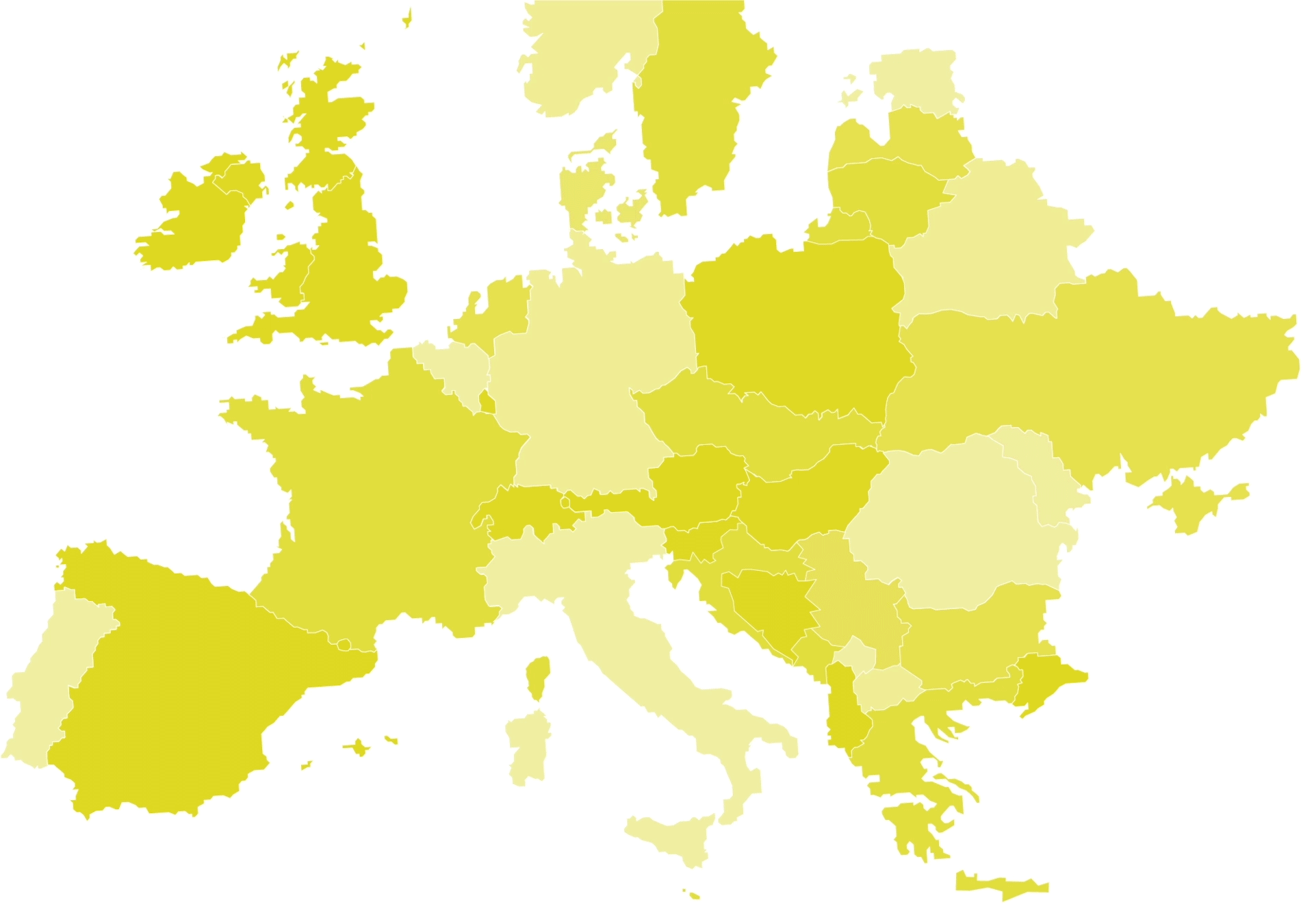
Ethical Banks Compared to Significant European Banks
The Sixth Report aims to compare the profitability, adequacy, and financial performance of European ethical banks with "significant banks" directly supervised by the ECB. 22 European ethical banks, members of the Global Alliance for Banking on Values (GABV) and the European Federation of Ethical and Alternative Banks (FEBEA), underwent examination. Furthermore, data spanning the past decade was used to assess 60 major European banks under the direct supervision of the ECB. This analysis extends beyond mere profitability evaluation, aiming to understand how ethical banks, which prioritise social and environmental concerns over profits, fit into the European banking system. It covers a 10-year period from 2012 to 2021, heavily influenced by the Covid-19 pandemic, as discussed in the Fifth Report.
Profitability: Ethical banks consistently outperformed significant banks in terms of profitability. Return on Equity (ROE) for ethical banks averaged 5.23% compared to 2.21% for significant banks. Return on Assets (ROA) also favoured ethical banks with an average of 0.46% against 0.25%. The pandemic affected both groups in 2020, but they rebounded in 2021.
ROE.
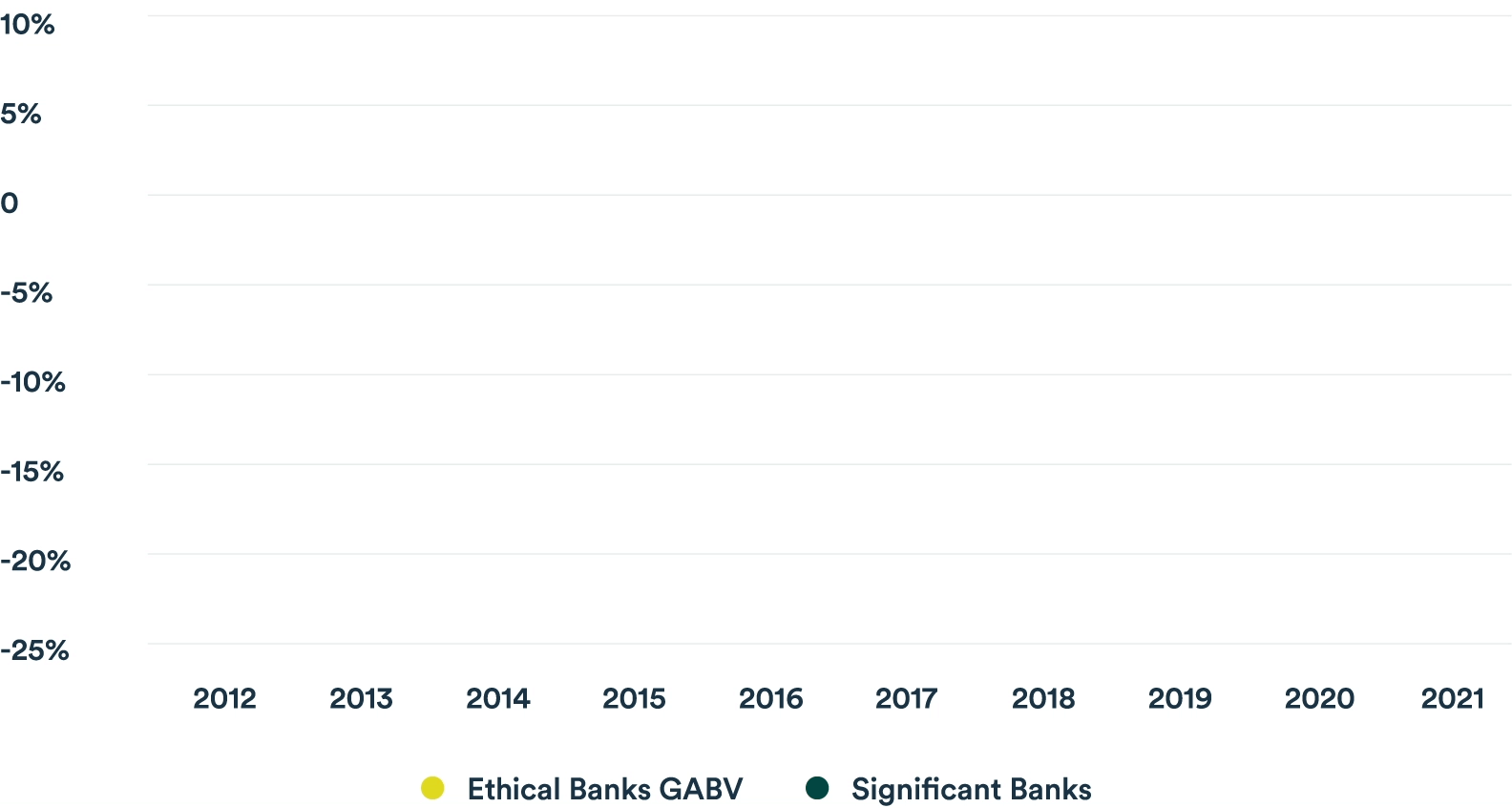
Credit Activity: Ethical banks focus more on traditional banking activities, primarily credit, representing 65,4% of their assets in 2021, against 50.8% of assets for mainstream banks, which prefer financial activities such as investment or placement of funds and securities.
Ratio of assets allocated to lending.
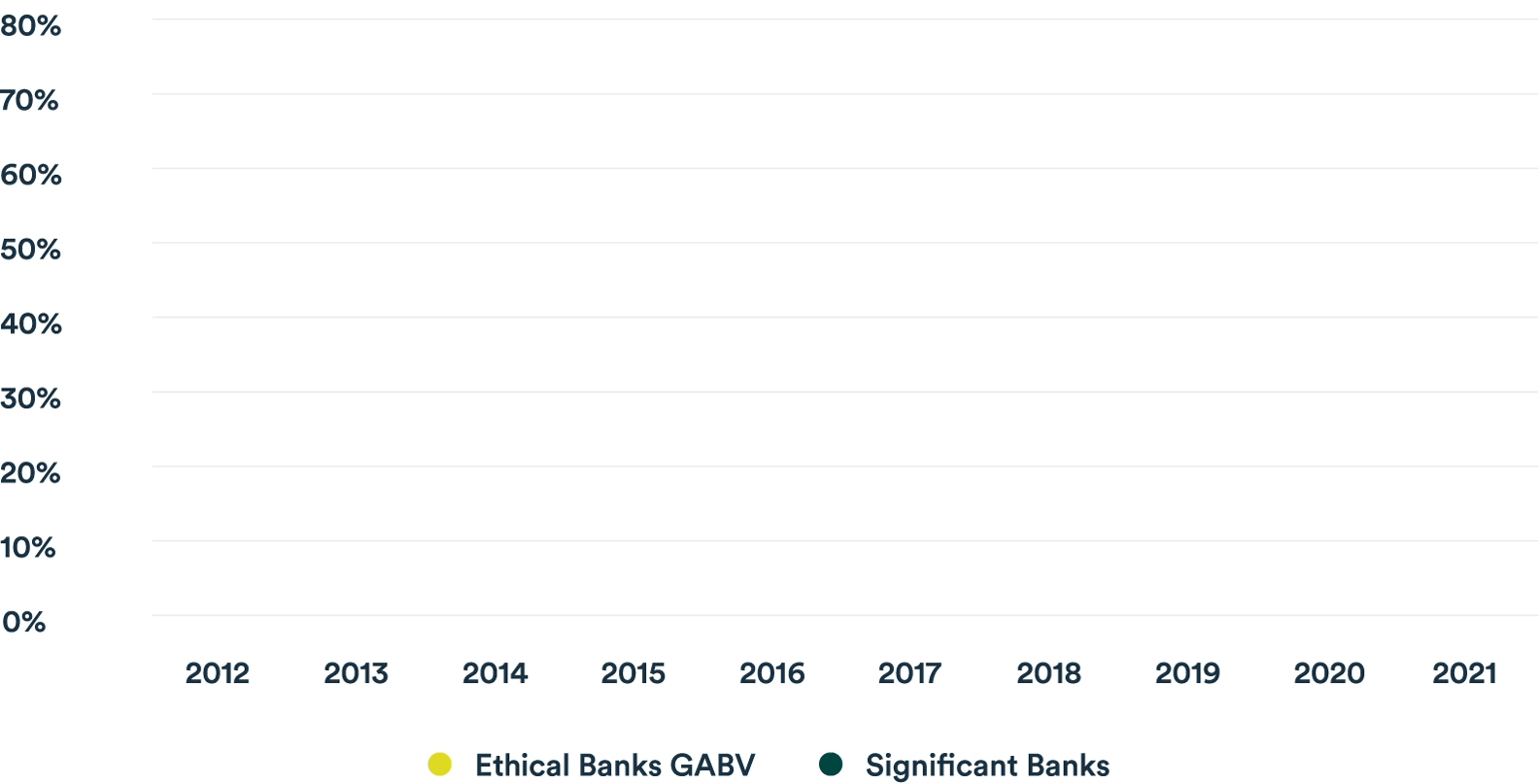
Deposits: Ethical banks primarily rely on customer deposits, accounting for 79.3% of total liabilities, while significant banks rely on various sources of liquidity, resulting in a lower deposit-to-liabilities ratio (68.7%). Ethical banks recorded a slight decrease in deposits as a percentage of total liabilities of 1.4 percentage points from 2012 to 2021. While for conventional banks, deposits on total liabilities increased by 10.2 percentage points over the same period.
Ratio of deposits to total liabilities.
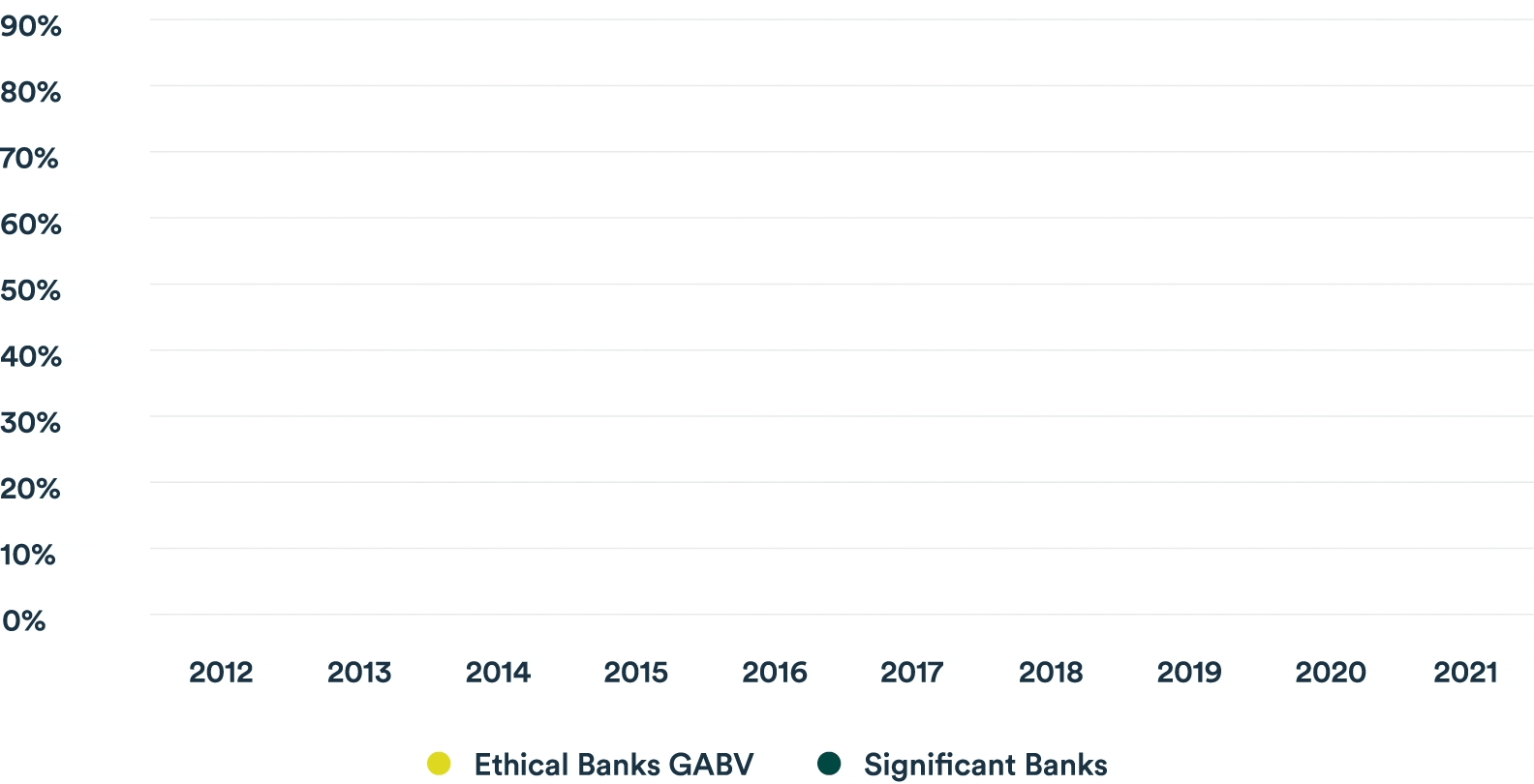
Capital Strength: Ethical banks consistently maintained strong capitalisation with net equity to total liabilities ratio averaging 8.2%. Significant banks improved their capital position but started from a weaker point, rising from 4.3% in 2012 to 6.20% in 2021.
Ratio of net worth to total liabilities.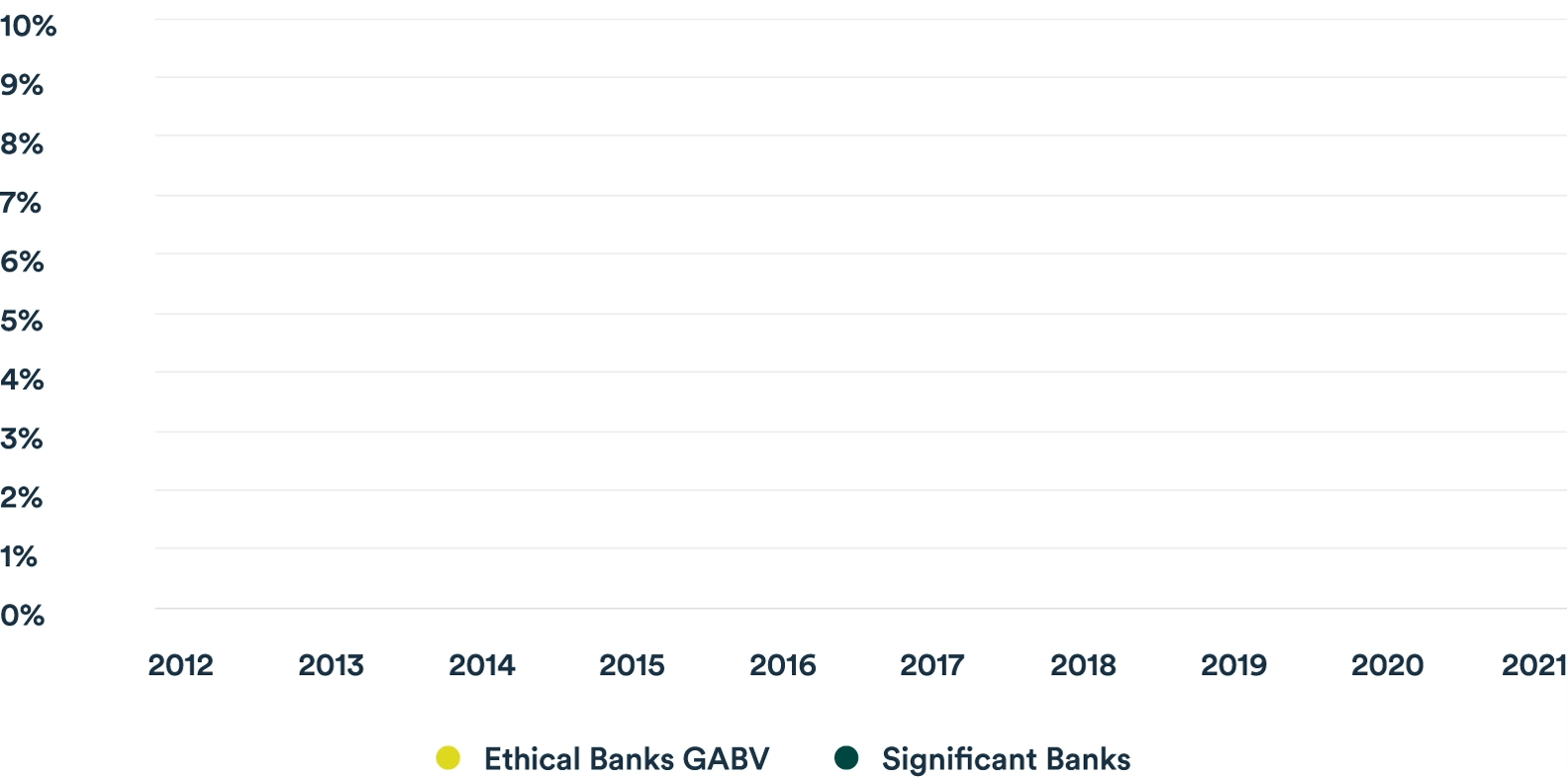
Liquidity: Ethical banks maintained a stable loan-to-deposit ratio (LDR) with an average of 81.5%, while significant banks had a higher average of 102.5%, indicating higher liquidity risk. In 2021, ethical banks had an LDR of 77%, for significant banks it was equal to 86%. LDR assesses bank liquidity, comparing total loans and total deposits within the same period. High percentage indicates risk due to tied-up assets, challenging loss coverage and cash outflows.
Loan-to-Deposit Ratio (LDR).
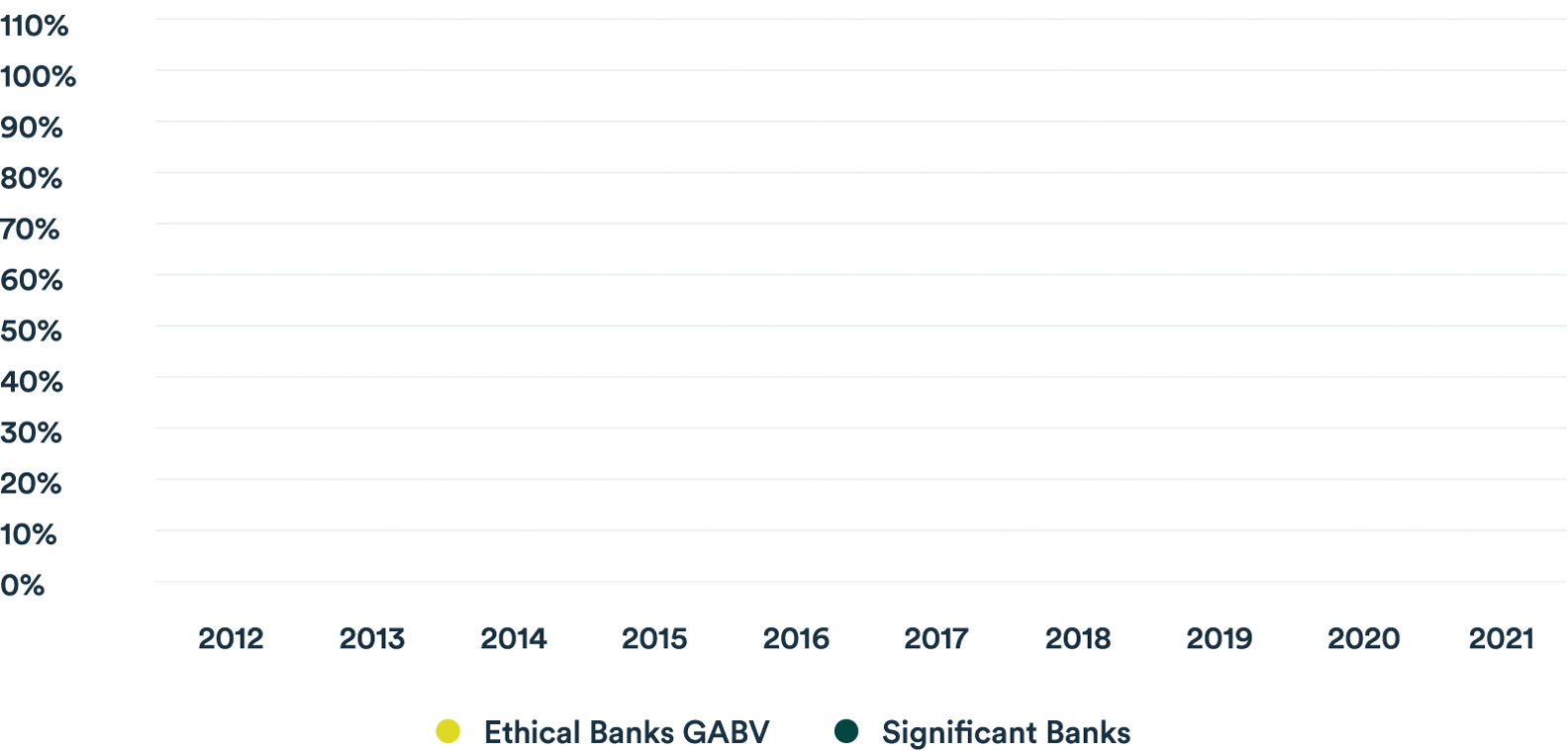
In summary, ethical banks, which prioritise traditional banking activities, maintained strong capitalisation and stable liquidity between 2012 and 2021. They consistently outperformed significant banks in terms of profitability. On the other hand, significant banks are more oriented to financial activities. They improved their capitalisation but have a higher liquidity risk than ethical banks. The pandemic impacted both groups in 2020, but they both recovered in 2021.
Aggregated numbers of European ethical banks (2021)

The data for 2021 includes the financial statements of the 22 ethical banks analysed in the research, along with the 2021 data of Coop57 (Spain), Femu Qui (Corsica, France), Etika (Luxembourg), Ucit (Great Britain), Sidi (France), and Sifa (France). While, strictly speaking, these latter entities are not banks, they however provide credits following the principles of ethical banks
Finance for climate
Climate change presents two key approaches: mitigation and adaptation. Mitigation targets emissions reduction via fossil fuel phase-out and bolstering carbon sinks like oceans, forests, and soil. Adaptation aims to lower vulnerability with strategies such as heat-resistant crops and coastal defences.
These priorities impact global economics. Despite mitigation investment growth to $571B annually in 2019-2020, action falls short to limit 1.5°C rise. Developing nations need more financial aid, per IPCC’s Sixth Assessment Report.
Regarding adaptation, the 2022 Adaptation Gap Report finds a sizable $160-340B gap by 2030 and $315-565B by 2050 for developing nations.
Mainstream banks launch green instruments, but their fossil fuel financing ($5.5T since 2016) often contradicts net-zero aims. Only 7% energy funding of major mainstream banks was for renewables in the period 2016-2022.
Mainstream and ethical banks have distinct approaches to reducing their climate impact. While mainstream banks often rely on questionable metrics or depend on technologies in development (such as, for example, carbon capture and storage) to claim climate goals, ethical banks take a comprehensive approach, encompassing environment, society and governance. They adopt the PCAF (Partnership for Carbon Accounting Financials) model for emissions accounting and advocate for science-based targets.
The GHG Protocol assesses emissions according to 3 scopes: 1. direct, 2. indirect from power, 3. indirect from supply chain. Ethical banks are pioneering the adoption of the stricter PCAF methodology, aligning with the Paris Agreement. The standardised PCAF method drives effective climate action.
Case studies
Banca Etica
Pioneered incorporating ESG considerations into credit risk assessment, using a Socio-Environmental Assessment (VSA) since the early 2000s. The bank discloses its financial activities' emissions based on the PACF protocol and helps customers calculating their Scope 1 and 2 emissions. Customers' emission reduction plans may lead to more favourable interest rates
Finance for Peace
The conflict in Ukraine in 2022 led to a surge in global military spending, with SIPRI (Stockholm International Peace Research Institute) reporting a 3.7% increase, totalling a record £2.24 trillion. European military spending increased by 13%. Several European banks have considered increasing investment in the arms industry after the Russian invasion, providing financial services to weapon manufacturers exporting to high-risk countries.
PAX’s report shows 15 major European banks offering loans and underwriting worth €87.7 billion to such companies, including Airbus and General Electric. The “Don’t bank on the bomb” report (published by PAX) reveals 306 banks supporting 24 nuclear weapons producers with $746 billion, with U.S. banks leading the ranking and BNP Paribas being the top European bank. Cluster bombs, banned by the UN Convention, saw reduced investment, but still amounted to $8.7 billion in 2018.
Exclusion criteria of major European ethical banks
Crédit Coopératif
Exclusion of weapon-related businesses from financing.
Ethical Finance: Demands on European Institutions
In the financial market, one size rarely fits all.
This truth becomes evident when considering the array of diverse banking models. However, the solution isn’t to carve out a niche solely for ethical finance; instead, regulatory efforts should aim to rectify shortcomings within the entire financial system. Transnational corporations and social economy actors have distinct needs. A multifaceted society demands various financial tools, showing the need for “banking biodiversity.”
In our pursuit of these objectives, the implementation of regulations is paramount. We highlight three proposals, each focused on one of the traditional ESG pillars. Ethical finance, though, views ESG holistically. Here, we present one proposal for each pillar.
ENVIRONMENT
Climate change is one of the most challenging issues of our times and financial markets’ role in fighting it is crucial. Major banks claim “sustainability,” yet funnelled $5.5 trillion to fossil fuels in the last 7 years. Finance must act, not just speak, countering greenwashing. EU’s progress is good, but insufficient. ‘Net zero’ focus could spur law changes. Many banks and financial institutions pledge net zero, often just for reputational reasons, not real change.
Ethical finance is more transparent, with more precise emissions accounting and offsets. It sidesteps polluting sectors. A strong framework is vital against greenwashing, aligning ‘net zero’ actions with claims.
SOCIAL
Inequality plagues our social fabric, reflected in wealth disparities and limited access to financial services for vulnerable populations. Gender pay gaps persist, especially in finance. We propose introducing a ‘social supporting factor’ to boost the growth of the social economy sector, microfinance, and financial inclusion. This aligns with EU objectives and does not impose costs on states, considering the challenges associated with public debt.
GOVERNANCE
Transparency defines ethical banks, permeating all aspects from loans to holdings. Vital is addressing tax evasion and fighting tax havens, which continue to thrive, despite being on the EU agenda. Major financial groups exploit these issues, while EU countries compete instead of uniting to combat these problems. Progress like country-by-country reporting occurred, but limitations persist, especially public access to corporate data. Regulations fall short against opacity. Financial entities use conduit jurisdictions to evade taxes, fuelling injustice and inequality.
In closing
The financial landscape is contradictory, favouring large players over unique approaches like ethical finance. These are the key issues we highlight: targeting net zero, fighting inequalities and fostering transparency. Lack of clear net zero rules lets banks make empty claims, while genuine sustainability efforts face challenges. Social economy firms and job creators face heavier regulations than speculative market players. Tax havens unfairly benefit exploiters.
European ethical finance has demonstrated strengths in multiple aspects, warranting acknowledgment. Encouraging its development should be a priority for regulators, avoiding hindrances.